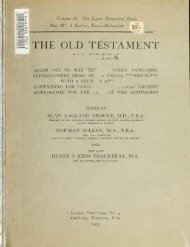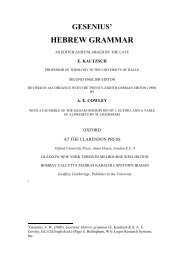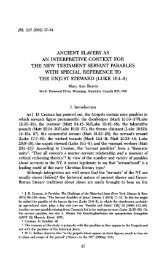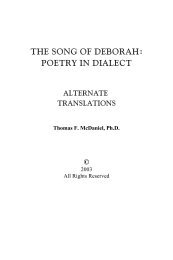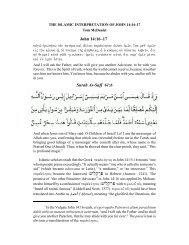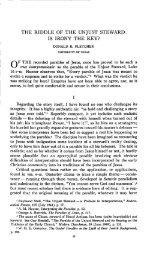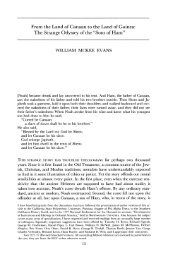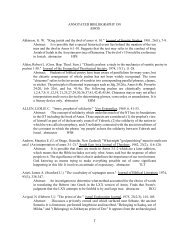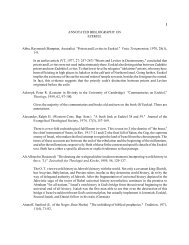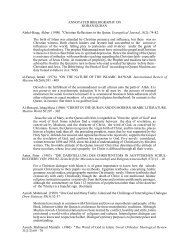- Page 1 and 2: THE SONG OF DEBORAH: POETRY IN DIAL
- Page 3 and 4: �����������
- Page 5 and 6: CONTENTS CHAPTER TWO: THE LITERARY
- Page 7 and 8: CONTENTS CHAPTER SIX: COMMENTARY AN
- Page 9 and 10: CONTENTS IV. Index of roots and wor
- Page 11 and 12: PREFACE I offer here a translation
- Page 13 and 14: ABBREVIATIONS A-text Codex Alexandr
- Page 15 and 16: ABBREVIATIONS OLZ Orientalische Lit
- Page 17 and 18: 2 THE SONG OF DEBORAH: POETRY IN DI
- Page 19 and 20: 4 THE SONG OF DEBORAH: POETRY IN DI
- Page 21 and 22: 6 THE SONG OF DEBORAH: POETRY IN DI
- Page 23 and 24: 8 THE SONG OF DEBORAH: POETRY IN DI
- Page 25 and 26: 10 THE SONG OF DEBORAH: POETRY IN D
- Page 27 and 28: 12 THE SONG OF DEBORAH: POETRY IN D
- Page 29 and 30: 14 THE SONG OF DEBORAH: POETRY IN D
- Page 31 and 32: 16 THE SONG OF DEBORAH: POETRY IN D
- Page 33: 18 THE SONG OF DEBORAH: POETRY IN D
- Page 37 and 38: 22 THE SONG OF DEBORAH: POETRY IN D
- Page 39 and 40: 24 THE SONG OF DEBORAH: POETRY IN D
- Page 41 and 42: 26 THE SONG OF DEBORAH: POETRY IN D
- Page 43 and 44: 28 THE SONG OF DEBORAH: POETRY IN D
- Page 45 and 46: 30 THE SONG OF DEBORAH: POETRY IN D
- Page 47 and 48: 32 THE SONG OF DEBORAH: POETRY IN D
- Page 49 and 50: 34 THE SONG OF DEBORAH: POETRY IN D
- Page 51 and 52: 36 THE SONG OF DEBORAH: POETRY IN D
- Page 53 and 54: 38 THE SONG OF DEBORAH: POETRY IN D
- Page 55 and 56: 40 THE SONG OF DEBORAH: POETRY IN D
- Page 57 and 58: 42 THE SONG OF DEBORAH: POETRY IN D
- Page 59 and 60: CHAPTER THREE SHAMGAR BEN -ANAT: AN
- Page 61 and 62: 46 THE SONG OF DEBORAH: POETRY IN D
- Page 63 and 64: 48 THE SONG OF DEBORAH: POETRY IN D
- Page 65 and 66: 50 THE SONG OF DEBORAH: POETRY IN D
- Page 67 and 68: 52 THE SONG OF DEBORAH: POETRY IN D
- Page 69 and 70: 54 THE SONG OF DEBORAH: POETRY IN D
- Page 71 and 72: 56 THE SONG OF DEBORAH: POETRY IN D
- Page 73 and 74: 58 THE SONG OF DEBORAH: POETRY IN D
- Page 75 and 76: 60 THE SONG OF DEBORAH: POETRY IN D
- Page 77 and 78: 62 THE SONG OF DEBORAH: POETRY IN D
- Page 79 and 80: 64 THE SONG OF DEBORAH: POETRY IN D
- Page 81 and 82: 66 THE SONG OF DEBORAH: POETRY IN D
- Page 83 and 84: 68 THE SONG OF DEBORAH: POETRY IN D
- Page 85 and 86:
70 THE SONG OF DEBORAH: POETRY IN D
- Page 87 and 88:
72 THE SONG OF DEBORAH: POETRY IN D
- Page 89 and 90:
74 THE SONG OF DEBORAH: POETRY IN D
- Page 91 and 92:
76 THE SONG OF DEBORAH: POETRY IN D
- Page 93 and 94:
78 THE SONG OF DEBORAH: POETRY IN D
- Page 95 and 96:
80 THE SONG OF DEBORAH: POETRY IN D
- Page 97 and 98:
82 THE SONG OF DEBORAH: POETRY IN D
- Page 99 and 100:
84 THE SONG OF DEBORAH: POETRY IN D
- Page 101 and 102:
86 THE SONG OF DEBORAH: POETRY IN D
- Page 103 and 104:
88 THE SONG OF DEBORAH: POETRY IN D
- Page 105 and 106:
90 THE SONG OF DEBORAH: POETRY IN D
- Page 107 and 108:
92 THE SONG OF DEBORAH: POETRY IN D
- Page 109 and 110:
94 THE SONG OF DEBORAH: POETRY IN D
- Page 111 and 112:
96 THE SONG OF DEBORAH: POETRY IN D
- Page 113 and 114:
98 THE SONG OF DEBORAH: POETRY IN D
- Page 115 and 116:
100 THE SONG OF DEBORAH: POETRY IN
- Page 117 and 118:
102 THE SONG OF DEBORAH: POETRY IN
- Page 119 and 120:
104 THE SONG OF DEBORAH: POETRY IN
- Page 121 and 122:
112 Note also Maass 1961: 111. CHAP
- Page 123 and 124:
108 THE SONG OF DEBORAH: POETRY IN
- Page 125 and 126:
110 THE SONG OF DEBORAH: POETRY IN
- Page 127 and 128:
112 THE SONG OF DEBORAH: POETRY IN
- Page 129 and 130:
114 THE SONG OF DEBORAH: POETRY IN
- Page 131 and 132:
116 THE SONG OF DEBORAH: POETRY IN
- Page 133 and 134:
118 THE SONG OF DEBORAH: POETRY IN
- Page 135 and 136:
120 THE SONG OF DEBORAH: POETRY IN
- Page 137 and 138:
122 THE SONG OF DEBORAH: POETRY IN
- Page 139 and 140:
124 THE SONG OF DEBORAH: POETRY IN
- Page 141 and 142:
126 THE SONG OF DEBORAH: POETRY IN
- Page 143 and 144:
128 THE SONG OF DEBORAH: POETRY IN
- Page 145 and 146:
130 THE SONG OF DEBORAH: POETRY IN
- Page 147 and 148:
132 THE SONG OF DEBORAH: POETRY IN
- Page 149 and 150:
134 THE SONG OF DEBORAH: POETRY IN
- Page 151 and 152:
136 THE SONG OF DEBORAH: POETRY IN
- Page 153 and 154:
138 THE SONG OF DEBORAH: POETRY IN
- Page 155 and 156:
140 THE SONG OF DEBORAH: POETRY IN
- Page 157 and 158:
142 THE SONG OF DEBORAH: POETRY IN
- Page 159 and 160:
144 THE SONG OF DEBORAH: POETRY IN
- Page 161 and 162:
146 THE SONG OF DEBORAH: POETRY IN
- Page 163 and 164:
148 THE SONG OF DEBORAH: POETRY IN
- Page 165 and 166:
150 THE SONG OF DEBORAH: POETRY IN
- Page 167 and 168:
152 THE SONG OF DEBORAH: POETRY IN
- Page 169 and 170:
154 THE SONG OF DEBORAH: POETRY IN
- Page 171 and 172:
156 THE SONG OF DEBORAH: POETRY IN
- Page 173 and 174:
158 THE SONG OF DEBORAH: POETRY IN
- Page 175 and 176:
160 THE SONG OF DEBORAH: POETRY IN
- Page 177 and 178:
162 THE SONG OF DEBORAH: POETRY IN
- Page 179 and 180:
164 THE SONG OF DEBORAH: POETRY IN
- Page 181 and 182:
166 THE SONG OF DEBORAH: POETRY IN
- Page 183 and 184:
168 THE SONG OF DEBORAH: POETRY IN
- Page 185 and 186:
170 THE SONG OF DEBORAH: POETRY IN
- Page 187 and 188:
172 THE SONG OF DEBORAH: POETRY IN
- Page 189 and 190:
174 THE SONG OF DEBORAH: POETRY IN
- Page 191 and 192:
176 THE SONG OF DEBORAH: POETRY IN
- Page 193 and 194:
178 THE SONG OF DEBORAH: POETRY IN
- Page 195 and 196:
180 THE SONG OF DEBORAH: POETRY IN
- Page 197 and 198:
182 THE SONG OF DEBORAH: POETRY IN
- Page 199 and 200:
184 THE SONG OF DEBORAH: POETRY IN
- Page 201 and 202:
186 THE SONG OF DEBORAH: POETRY IN
- Page 203 and 204:
188 THE SONG OF DEBORAH: POETRY IN
- Page 205 and 206:
190 THE SONG OF DEBORAH: POETRY IN
- Page 207 and 208:
192 THE SONG OF DEBORAH: POETRY IN
- Page 209 and 210:
194 THE SONG OF DEBORAH: POETRY IN
- Page 211 and 212:
196 THE SONG OF DEBORAH: POETRY IN
- Page 213 and 214:
198 THE SONG OF DEBORAH: POETRY IN
- Page 215 and 216:
200 THE SONG OF DEBORAH: POETRY IN
- Page 217 and 218:
202 THE SONG OF DEBORAH: POETRY IN
- Page 219 and 220:
204 THE SONG OF DEBORAH: POETRY IN
- Page 221 and 222:
206 THE SONG OF DEBORAH: POETRY IN
- Page 223 and 224:
208 THE SONG OF DEBORAH: POETRY IN
- Page 225 and 226:
210 THE SONG OF DEBORAH: POETRY IN
- Page 227 and 228:
212 THE SONG OF DEBORAH: POETRY IN
- Page 229 and 230:
214 THE SONG OF DEBORAH: POETRY IN
- Page 231 and 232:
216 THE SONG OF DEBORAH: POETRY IN
- Page 233 and 234:
218 THE SONG OF DEBORAH: POETRY IN
- Page 235 and 236:
220 THE SONG OF DEBORAH: POETRY IN
- Page 237 and 238:
222 THE SONG OF DEBORAH: POETRY IN
- Page 239 and 240:
224 THE SONG OF DEBORAH: POETRY IN
- Page 241 and 242:
226 THE SONG OF DEBORAH: POETRY IN
- Page 243 and 244:
228 THE SONG OF DEBORAH: POETRY IN
- Page 245 and 246:
230 THE SONG OF DEBORAH: POETRY IN
- Page 247 and 248:
232 THE SONG OF DEBORAH: POETRY IN
- Page 249 and 250:
CHAPTER SEVEN SUMMARY AND CONCLUSIO
- Page 251 and 252:
236 THE SONG OF DEBORAH: POETRY IN
- Page 253 and 254:
238 THE SONG OF DEBORAH: POETRY IN
- Page 255 and 256:
240 THE SONG OF DEBORAH: POETRY IN
- Page 257 and 258:
242 THE SONG OF DEBORAH: POETRY IN
- Page 259 and 260:
244 THE SONG OF DEBORAH: POETRY IN
- Page 261 and 262:
246 THE SONG OF DEBORAH: POETRY IN
- Page 263 and 264:
248 THE SONG OF DEBORAH: POETRY IN
- Page 265 and 266:
250 THE SONG OF DEBORAH: POETRY IN
- Page 267 and 268:
252 THE SONG OF DEBORAH: POETRY IN
- Page 269 and 270:
254 THE SONG OF DEBORAH: POETRY IN
- Page 271 and 272:
BIBLIOGRAPHY FOR THE STUDY OF JUDGE
- Page 273 and 274:
258 THE SONG OF DEBORAH: POETRY IN
- Page 275 and 276:
260 THE SONG OF DEBORAH: POETRY IN
- Page 277 and 278:
262 THE SONG OF DEBORAH: POETRY IN
- Page 279 and 280:
264 THE SONG OF DEBORAH: POETRY IN
- Page 281 and 282:
266 THE SONG OF DEBORAH: POETRY IN
- Page 283 and 284:
268 THE SONG OF DEBORAH: POETRY IN
- Page 285 and 286:
270 THE SONG OF DEBORAH: POETRY IN
- Page 287 and 288:
272 THE SONG OF DEBORAH: POETRY IN
- Page 289 and 290:
274 THE SONG OF DEBORAH: POETRY IN
- Page 291 and 292:
276 THE SONG OF DEBORAH: POETRY IN
- Page 293 and 294:
278 THE SONG OF DEBORAH: POETRY IN
- Page 295 and 296:
280 THE SONG OF DEBORAH: POETRY IN
- Page 297 and 298:
282 THE SONG OF DEBORAH: POETRY IN
- Page 299 and 300:
284 THE SONG OF DEBORAH: POETRY IN
- Page 301 and 302:
286 THE SONG OF DEBORAH: POETRY IN
- Page 303 and 304:
288 THE SONG OF DEBORAH: POETRY IN
- Page 305 and 306:
290 THE SONG OF DEBORAH: POETRY IN
- Page 307 and 308:
292 THE SONG OF DEBORAH: POETRY IN
- Page 309 and 310:
294 THE SONG OF DEBORAH: POETRY IN
- Page 311 and 312:
296 THE SONG OF DEBORAH: POETRY IN
- Page 313 and 314:
298 THE SONG OF DEBORAH: POETRY IN
- Page 315 and 316:
300 THE SONG OF DEBORAH: POETRY IN
- Page 317 and 318:
302 THE SONG OF DEBORAH: POETRY IN
- Page 319 and 320:
304 THE SONG OF DEBORAH: POETRY IN
- Page 321 and 322:
306 THE SONG OF DEBORAH: POETRY IN
- Page 323 and 324:
308 THE SONG OF DEBORAH: POETRY IN
- Page 325 and 326:
310 THE SONG OF DEBORAH: POETRY IN
- Page 327 and 328:
312 THE SONG OF DEBORAH: POETRY IN
- Page 329 and 330:
314 THE SONG OF DEBORAH: POETRY IN
- Page 331 and 332:
316 THE SONG OF DEBORAH: POETRY IN
- Page 333 and 334:
318 THE SONG OF DEBORAH: POETRY IN
- Page 335 and 336:
320 THE SONG OF DEBORAH: POETRY IN
- Page 337 and 338:
322 THE SONG OF DEBORAH: POETRY IN
- Page 339 and 340:
324 THE SONG OF DEBORAH: POETRY IN
- Page 341 and 342:
326 THE SONG OF DEBORAH: POETRY IN
- Page 343 and 344:
328 THE SONG OF DEBORAH: POETRY IN
- Page 345 and 346:
330 THE SONG OF DEBORAH: POETRY IN
- Page 347 and 348:
332 THE SONG OF DEBORAH: POETRY IN
- Page 349 and 350:
334 THE SONG OF DEBORAH: POETRY IN
- Page 351 and 352:
336 THE SONG OF DEBORAH: POETRY IN
- Page 353 and 354:
338 THE SONG OF DEBORAH: POETRY IN
- Page 355 and 356:
340 THE SONG OF DEBORAH: POETRY IN
- Page 357 and 358:
342 THE SONG OF DEBORAH: POETRY IN
- Page 359 and 360:
344 THE SONG OF DEBORAH: POETRY IN
- Page 361 and 362:
346 THE SONG OF DEBORAH: POETRY IN
- Page 363 and 364:
348 THE SONG OF DEBORAH: POETRY IN
- Page 365 and 366:
350 THE SONG OF DEBORAH: POETRY IN
- Page 367 and 368:
352 THE SONG OF DEBORAH: POETRY IN
- Page 369 and 370:
354 THE SONG OF DEBORAH: POETRY IN
- Page 371 and 372:
356 THE SONG OF DEBORAH: POETRY IN
- Page 373 and 374:
358 THE SONG OF DEBORAH: POETRY IN
- Page 375 and 376:
360 THE SONG OF DEBORAH: POETRY IN
- Page 377 and 378:
362 THE SONG OF DEBORAH: POETRY IN
- Page 379 and 380:
364 THE SONG OF DEBORAH: POETRY IN
- Page 381 and 382:
366 THE SONG OF DEBORAH: POETRY IN
- Page 383 and 384:
368 THE SONG OF DEBORAH: POETRY IN
- Page 385 and 386:
370 THE SONG OF DEBORAH: POETRY IN
- Page 387 and 388:
372 THE SONG OF DEBORAH: POETRY IN
- Page 389 and 390:
374 THE SONG OF DEBORAH: POETRY IN
- Page 391 and 392:
376 THE SONG OF DEBORAH: POETRY IN
- Page 393 and 394:
378 THE SONG OF DEBORAH: POETRY IN
- Page 395 and 396:
380 THE SONG OF DEBORAH: POETRY IN
- Page 397 and 398:
382 THE SONG OF DEBORAH: POETRY IN
- Page 399 and 400:
384 THE SONG OF DEBORAH: POETRY IN
- Page 401 and 402:
386 THE SONG OF DEBORAH: POETRY IN
- Page 403 and 404:
388 THE SONG OF DEBORAH: POETRY IN
- Page 405 and 406:
390 THE SONG OF DEBORAH: POETRY IN
- Page 407 and 408:
392 THE SONG OF DEBORAH: POETRY IN
- Page 409 and 410:
394 THE SONG OF DEBORAH: POETRY IN
- Page 411 and 412:
396 THE SONG OF DEBORAH: POETRY IN



